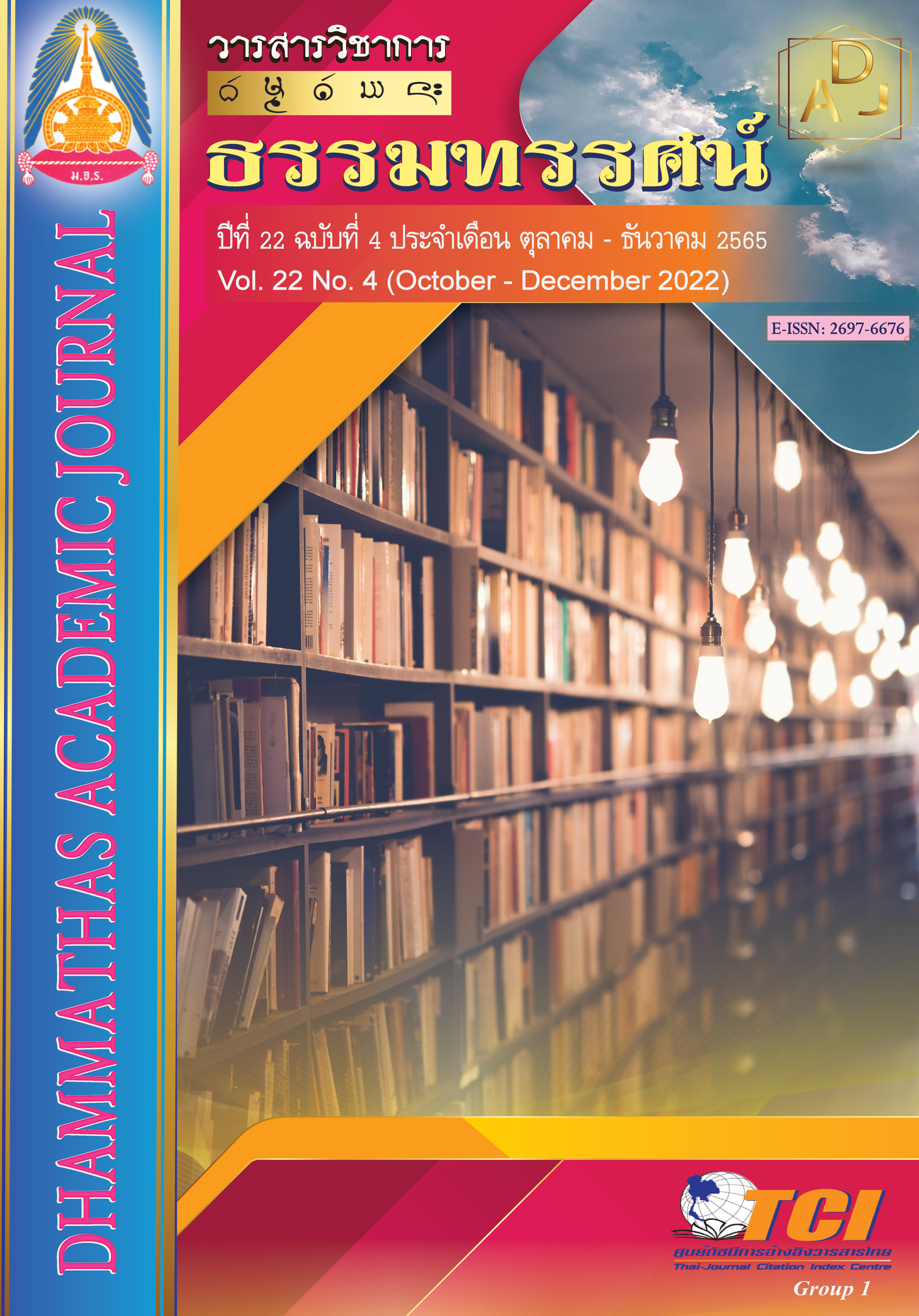A Model for Applying the Tisikkhā Principles in Improving the Quality of Life of the Elderly in NongYai Subdistrict School for the Elderly, Si Somdet District, Roi Et Province
Main Article Content
Abstract
The objectives of this research were: 1) to study the use of the Tisikkhā principles in improving the quality of life of the elderly; 2) to study the application of the Tisikkhā principles to improve the quality of life of the elderly at NongYai Sub district School for the Elderly, Si Somdet District Roi Et Province; 3) to study the model for applying the Trisikkha principle in improving the quality of life of the elderly at NongYai Sub district School for the Elderly. This study was carried out by means of qualitative research, and the obtained data were interpreted by descriptive analysis.
The research results were as follows:
1. The application of the Tisikkhā principles to improve the quality of life for the elderly: physical aspect: the elderly develop self-consciousness and stay in heedfulness; social aspect: the elderly set themselves up within the framework of good social conduct; mental aspect: the elderly have trained their minds to be bright and develop the wisdom to be a reasonable person; intellectual aspect: the elderly have self-development in daily life and live together in society happily according to the Tisikkhā principles.
2. The application of the Tisikkhā principles to improve the quality of life of the elderly at NongYai Sub district School for the Elderly, Si Somdet District Roi Et Province: physical aspect: they have beautiful physical behaviors; mental aspect: they are emotionally in the Dhamma and have the bright mind; intellectual aspect: to create knowledge and understanding of the changes of nature to create a free mind.
3. The model for applying the Trisikkha principle in improving the quality of life of the elderly at NongYai Sub district School for the Elderly: physical aspect: physical behavior is beautiful because there are precepts as the body cover; mental aspect: calm mind, not distracted mind, bright mind to create relaxation because the mind is concentrated; intellectual aspect: contemplation and knowing the emotions, enlightenment according to the Dhamma state because wisdom is the lead.
Article Details

This work is licensed under a Creative Commons Attribution-NonCommercial-NoDerivatives 4.0 International License.
เพื่อให้เป็นไปตามกฎหมายลิขสิทธิ์ ผู้นิพนธ์ทุกท่านต้องลงลายมือชื่อในแบบฟอร์มใบมอบลิขสิทธิ์บทความ ให้แก่วารสารฯ พร้อมกับบทความต้นฉบับที่ได้แก้ไขครั้งสุดท้าย นอกจากนี้ ผู้นิพนธ์ทุกท่านต้องยืนยันว่าบทความ ต้นฉบับที่ส่งมาตีพิมพ์นั้น ได้ส่งมาตีพิมพ์เฉพาะในวารสาร วิชาการธรรม ทรรศน์ เพียงแห่งเดียวเท่านั้น หากมีการใช้ ภาพหรือตารางของผู้นิพนธ์อื่นที่ปรากฏในสิ่งตีพิมพ์อื่นมาแล้ว ผู้นิพนธ์ต้องขออนุญาตเจ้าของลิขสิทธิ์ก่อน พร้อมทั้ง แสดงหนังสือที่ได้รับการยินยอมต่อบรรณาธิการ ก่อนที่บทความจะได้รับการตีพิมพ์References
กระทรวงการพัฒนาสังคมและความมั่นคงของมนุษย์. (2553). แผนผู้สูงอายุแห่งชาติ ฉบับที่ 2 พ.ศ. 2563-2564. กรุงเทพฯ: เทพเพ็ญวานิช.
บรรลุ ศิริพานิช. (2553). สถานการณ์ผู้สูงอายุไทย พ.ศ. 2552. กรุงเทพฯ: บริษัท ทีคิวพี.
พระเทพเวที (ประยุทธ์ ปยุตฺโต). (2534). พุทธศาสนากับการแนะแนว. กรุงเทพฯ: สมาคมแนะแนวแห่งประเทศไทย.
ภิรมย์ เจริญผล. (2553). ศึกษาวิเคราะห์หลักพุทธธรรมที่ใช้ในการดําเนินชีวิตของผู้สูงอายุ: กรณีศึกษาผู้สูงอายุในสถานสงเคราะห์ จังหวัดนครปฐม. (วิทยานิพนธ์พุทธศาสตรมหาบัณฑิต). พระนครศรีอยุธยา: มหาวิทยาลัยมหาจุฬาลงกรณราชวิทยาลัย.
มหาจุฬาลงกรณราชวิทยาลัย. (2560). พระไตรปิฎกภาษาไทย ฉบับมหาจุฬาลงกรณราชวิทยาลัย. กรุงเทพฯ: มหาจุฬาลงกรณราชวิทยาลัย.
วิพรรณ ประจวบเหมาะ และคณะ. (2552). รายงานการศึกษาโครงการปรับแผนผู้สูงอายุแห่งชาติ ฉบับที่ 2 พ.ศ. 2563-2564. กรุงเทพฯ: วิทยาลัยประชากรศาสตร์ จุฬาลงกรณ์มหาวิทยาลัย.
ศิริวรรณ ศิริบุญ และชเนตตี มิลินทางกูร. (2551). ทำไมสังคมไทยต้องให้ความสนใจเรื่องผู้สูงอายุ. กรุงเทพฯ: ฐานข้อมูลประชากรฝ่ายวิจัยและศูนย์สารสนเทศ.
สำนักสถิติเศรษฐกิจและสังคมกลุ่มสถิติแรงงาน. (2560). การทำงานของผู้สูงอายุในประเทศไทย. กรุงเทพฯ: สำนักสถิติเศรษฐกิจและสังคม.
สำราญ วงศ์คำพันธ์. (2556). กระบวนการสอนตามหลักไตรสิกขาในโรงเรียนไมตรีจิตไทย-อเมริกัน. (วิทยานิพนธ์พุทธศาสตรมหาบัณฑิต). พระนครศรีอยุธยา: มหาวิทยาลัยมหาจุฬาลงกรณราชวิทยาลัย.
อภินันท์ สนน้อย, ปิยาภรณ์ ศิริภานุมาศ และสุรชัย ปิยานุกูล. (2559). รูปแบบการพัฒนาคุณภาพชีวิตผู้สูงอายุ ในจังหวัดบุรีรัมย์. วารสารวิชาการ มหาวิทยาลัยราชภัฏบุรีรัมย์, 8(2), 153-169.
อัมภัสชา พานิชชอบ. (2546). การศึกษาคุณภาพชีวิตของผู้สูงอายุ ในสถานสงเคราะห์คนชรา บ้านบางแค และสถานที่พักผู้สูงอายุเอกชน ในกรุงเทพมหานครและปริมณฑล. กรุงเทพฯ: จุฬาลงกรณ์มหาวิทยาลัย.

